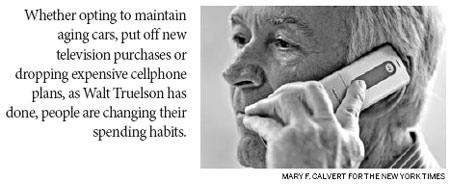Society
Throwaway culture pauses, making stuff last longer
Updated: 2011-03-13 07:57
By Matt Richtel (New York Times)

Consumer spending has picked up, but for some the global downturn has left something behind: a greater interest in making stuff last.
It is hardly the tale of generations past, those stung by the Great Depression, who held onto antediluvian dishware and stored canned goods until rust formed on the lids. But for the moment, many citizens of throwaway societies are making fewer visits to the trash and recycling bins.
For a number of products - cars, phones, computers, even shampoo and toothpaste - the data shows a slowing of product life cycles and consumption. In many cases the difference is months, but economists and consumers say the approach may outlast a full recovery because of the strong impression the downturn made.
But other experts and historians argue that as spending and credit return, so will yearnings to favor brands, fashion and novelty over practicality.
In the case of televisions, upgrades have slowed, but only because so many people snapped up flat-panel sets in recent years. There is now a lull in the product cycle, but not necessarily in consumer demand.
But in some important categories there are indications of slowed upgrades. American consumers are holding onto new cars for a record 63.9 months, up 4.5 months from a year ago and 14 percent since the end of 2008, according to Polk, an automotive research firm. In fact, when used cars are included, the average length of car ownership stands at 52.2 months, also a record.
Industry analysts also report that Americans on average upgrade their cellphones every 18 months, up from every 16 months just a few years ago. They hold onto laptops an average of 4 years and 4 months, a month longer than they did a year ago, though that figure has been creeping up since 2000.
Consumers are making sure to get the last drop from their household products, said Ali Dibadj, an analyst at Sanford C. Bernstein, an investment research firm that covers companies like Colgate-Palmolive and Clorox.
"People are squeezing the last bit out of the shampoo," Mr. Dibadj said, noting financial reports from major companies showing frugality with things like razor blades, laundry detergent and toothpaste. "Consumers are doing their best to conserve."
Nancy F. Koehn, a professor at the Harvard Business School and a historian of consumer behavior, is certain that the change was, if not permanent, at least lasting. She said it stemmed not just from a shaky economy but also from a sense that great institutions - like government and major corporations - might not be reliable saviors in a crisis.
"We're not going back to a time of our grandmothers' tales of what they kept and how they used things so carefully. But we'll see a consistent inching or trudging towards that," Professor Koehn said. "It's a glimmer of that, a flickering of it."
For Walt Truelson, a management consultant in Portland, Oregon, that has meant a shift in his lifelong love affair with cars, specifically Jaguars. He typically bought a new or slightly used one every year or two, but has had his current car, a 1999 model in dark green, for four years. "It's going to stay in my possession as long as it runs," he said.
Mr. Truelson also switched 18 months ago to paying for cellphone minutes as he uses them, rather than subscribing to a more costly monthly plan.
He said the changes reflect in part the fact that his business fell with the economy, but also what he says is a reassessment of the need to constantly have new things: "It's a question of shifting values."
The New York Times
Specials

'Super moon'
The "Super Moon" arrives at its closest point to the Earth in 2011.

Radiation test
The probability of being exposed to a life-threatening level of radiation is quite slim.

Panic buying of salt
Worried Chinese shoppers stripped stores of salt on radiation fears.